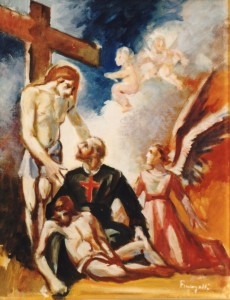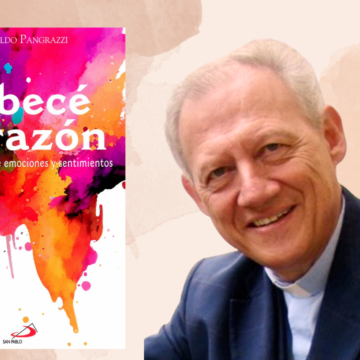Fr. Giuseppe Cinà, M.I.
An ancient and always new problem in Christian spirituality has been, and remains, that of balancing ‘action and contemplation’. This tandem springs from the centre of Biblical and Christian faith: love for God and love for neighbour. The Gospel according to St. Luke has the famous text of Deuteronomy which prescribes loving God ‘with all your heart, all your soul and all your strength’, and adds the commandment to love your neighbour and makes clear how this should be done: ‘as yourself’ (Lk 10:27).
How can we Conjoin ‘Action and Contemplation’?
In Christian tradition the classical phrase that expresses the relationship between the two forms of behaviour was formulated by St. Benedict in the combination ‘ora et labora’. When in the modern epoch following the Council of Trent religious Orders and Congregations were born dedicated to an active ministry and social, works the question was posed in a new way: 
For Camillus and his young religious, the problem became even more complex because they saw their mission as being total and absolute dedication to care and assistance for sick people.
There then came the moment when the subject imposed itself on Camillus and his sons as well. ‘Between 1590 and 1591 Rome was severely afflicted by famine and pestilence. The crusade of charity had engaged the nascent Congregation beyond its strengths. Camillus was the first to have launched himself in all fields, from the hospital to the baths of Diocletian, from grottos to the cellars of the Coliseum, from stables to the small hospital of St. Sixtus, and from the streets to attics. Behind him were his religious. About fifteen lost their lives; others, beginning with the Founder, remained in a bad state. Some became dismayed, Camillus who was first puzzled and then worried about the fate of those who were dismayed, feared that ‘work not shared was the cause of not helping the spirit’.
It is from that year, indeed, that we have a letter written by St. Camillus to Father Oppertis, the Superior of the community of Naples, in which, in order to obviate the damage that excessive activity could cause to ‘helping the spirit’, he ordered that service should be provided to the sick ‘on alternate days by each one…which was nothing else – commented his first biographer (Sanzo Cicatelli) – but like, he said, giving one day to Martha and the other to Mary Magdalene, as he wanted his religious on the day when they had to stay at home to spend all their time in holy readings, prayers and meditations, drawing strength and spirit so as to spend well and perfectly the following day in the hospitals’(Vms., 114).
Camillus interpreted the famous gospel text about ‘Martha and Mary’ in conformity with the mentality of the time which saw a sort of contrast between the two forms of behaviour. Hence the drastic solution of ‘one day in…and one day in…’, which, however, was then regularly not followed when the needs of sick people presented themselves.
The Current Situation
We know how much today the tandem ‘action-contemplation’ is one of the hot points of the spiritual lives not only of men and women religious, or of priests alone, but of every Christian. By now the pronouncements of the Magisterium of the Church and of eminent theologians and spiritualists which refer to the urgent need for the believer to give room to an intimate, profound and prolonged encounter with the Lord and his words are numberless. Today, perhaps more than ever, in a frenetic society without criteria there is an urgent need to appeal to the contemplative dimension of Christian life. The statement of a famous theologian of our epoch is well known: ‘The Christian of the third millennium either will be a mystic or he will not be a Christian’ (K. Rahner).
But perhaps it is worthwhile reading again the gospel from which this formulation comes and offering some brief comments on it: ‘As Jesus and his disciples went on their way, he came to a village where a woman named Martha welcomed him in her home. She had a sister named Mary, who sat down at the feet of the Lord and listened to his teaching. Martha was upset over all the work she had to do, so she came and said, “Lord, don’t you care that mu sister has left me to do all the work by myself? Tell her to come and help me!”. The Lord answered her, “Martha, Martha! You are worried and troubled over so many things, but just one is needed. Mary has chosen the right thing, and it will not be taken away from her’ (Lk 10:38-42).
 This episode is placed in the central section of the gospel according to Luke which narrates Jesus going up to Jerusalem. On the journey there are those who welcome Jesus and those who reject him, as was the case with the first village of the Samaritans which was encountered at the beginning of this journey. In the immediate context, our passage is located between the parable of the ‘Good Samaritan’ and the teaching on prayer by the disciples. One thus understands that the evangelist wants to clarify specifically the meaning of the relationship between ‘doing’ and ‘prayer’.
This episode is placed in the central section of the gospel according to Luke which narrates Jesus going up to Jerusalem. On the journey there are those who welcome Jesus and those who reject him, as was the case with the first village of the Samaritans which was encountered at the beginning of this journey. In the immediate context, our passage is located between the parable of the ‘Good Samaritan’ and the teaching on prayer by the disciples. One thus understands that the evangelist wants to clarify specifically the meaning of the relationship between ‘doing’ and ‘prayer’.
However the principal theme of the passage is welcome: how should Jesus be welcomed? Both Martha and Mary welcome Jesus. But they do so in different ways. Martha performs the role of being the woman of the house, the housewife who acts so that the guest is served well and feels at ease. In effect Mary does not do anything: instead she sits ‘at the feet’ of Jesus and, as the evangelist emphasises, she ‘listened to his teaching’. She welcomes him therefore as a disciple who listens, reflects, and assimilates his message (Lk 2:19,51).
It is Martha who at a certain point provokes Jesus because she believes that her sister is making a mistake. Indeed, she wants Jesus himself to rebuke Mary for her passivity because she also should do something to honour their guest!
And Jesus responds. The reaction of Jesus must have been a cold shower for Martha. The Teacher calls on her to review the meaning and the reason for her behaviour. This behaviour, although done with the best of intentions, is mistaken.
Martha’s Mistake
Why is it mistaken? What did Jesus mean by that severe rebuke? Jesus repeated the name Martha twice: ‘Martha, Martha!’ This, according to Biblical tradition, is a sign of an urgent call or a ‘calling anew’ because the recipient had already been called to be a prophet or disciple, but it appears that she has forgotten this…
Indeed, Martha is not behaving like a ‘disciple’ but as the lady of the home who intends to serve Jesus…The mistake, however, is not ‘serving’ in itself but in the way she welcomes Jesus. The Lord here clearly dons the clothes of the ‘Teacher’. But Martha, taken up ‘with all the work she had to do’ no longer remembers that that she is first of all, and fundamentally, a ‘disciple’. She acts as though it was her duty ‘to do something for Jesus’. She does not realise that it is Jesus who came to ‘do something for her’, something that she absolutely needs because ‘without me you cannot do anything’ (Jn 15:5). She has lost from sight what is essential for a disciple, whether that disciple is a man or woman: to ‘receive’ his words, his presence. It is Jesus who saves and not the disciple; it is the disciple who is saved. Martha is sick with ‘protagonism’: she believes that she is serving Jesus whereas in fact she is satisfying herself, that is to say her overbearing need ‘to do’ and even ‘to do something for the Lord’!…
By this Jesus does not mean that a disciple must not ‘do’ or ‘serve’: the parable of the ‘Good Samaritan’ which immediately precedes our passage clearly pronounces on the need ‘to serve’ the other: ‘Go then, and do you likewise’. Thus a Christian must ‘do’, his or her love ‘should not be just words and talk; it must be true love, which shows itself in action’ (1 Jn 3:18). Therefore there is no contrast between ‘doing’ and ‘contemplating’ or ‘listening to the word’. Both these approaches should be cultivated and experienced.
The Right Relationship between Listening to the Word and Action
 There is, however, a hierarchy, where listening is a priority and a foundation: understanding the word of Jesus and the contemplation of his face, the love to be received and corresponded in the intimacy of a relationship of prayer. ‘Doing’ and ‘serving’ are born from ‘being with Jesus’; they are the outcome of this. Balthasar wrote a few years ago: ‘everything that is socially fruitful in the final analysis springs from the solitude of the person in God and with the interest that God feels for the world’. Only by being ‘at the feet of Jesus’ do we understand ‘the interest that God feels for the world’ and then we can serve the world, animated by that divine interest and not by the multiple ambiguous motivations that crowd our inner selves. How easily do we call ‘works of God’ or ‘works done for God’ what is only a mania for the gratification of our self-assertion.
There is, however, a hierarchy, where listening is a priority and a foundation: understanding the word of Jesus and the contemplation of his face, the love to be received and corresponded in the intimacy of a relationship of prayer. ‘Doing’ and ‘serving’ are born from ‘being with Jesus’; they are the outcome of this. Balthasar wrote a few years ago: ‘everything that is socially fruitful in the final analysis springs from the solitude of the person in God and with the interest that God feels for the world’. Only by being ‘at the feet of Jesus’ do we understand ‘the interest that God feels for the world’ and then we can serve the world, animated by that divine interest and not by the multiple ambiguous motivations that crowd our inner selves. How easily do we call ‘works of God’ or ‘works done for God’ what is only a mania for the gratification of our self-assertion.
It is not easy to discern the works that a Christian is called to engage in, the services that he must provide, especially for those in need. This is not easy because it is difficult to ‘listen’, above all to the word of God. And this is paradoxical because it seems to us to be the simplest thing in the world: listening, and even more for a believer listening to God who speaks to me!
And yet the insistence with which Jesus, connecting up with the ancient prophetic tradition, complains about our constant resistance to listening to, and understanding, his word should, instead, make us reflect. We should every so often think again about a certain passage from the gospel of Luke. Like for example the parable of the sower, with the emphasis that Jesus addressed to his disciples: ‘be careful about how you listen!’ (Lk 8:14).
For that matter, so that Martha could well understand the meaning of the relationship between action and contemplation, Jesus added: ‘Mary has chosen the right thing, and it will not be taken away from her’: indeed, engaging in ‘many things’ which generates worry and agitation, and specifically for this reason runs the risk of losing sight of the essential, passes away. What remains and what ‘will not be taken away’ is not simply the contemplative love of eternal life but this contemplative love as the soul and criterion of discernment of all action and of the whole of the apostolic ministry, of whatever kind it may be.














Camillians on Facebook
Camillians on Twitter
Camillians on Instagram